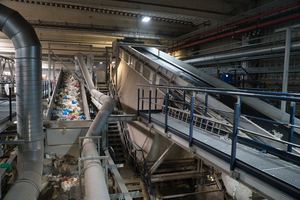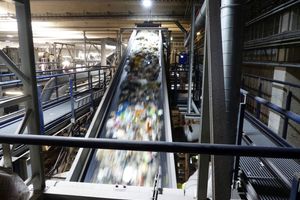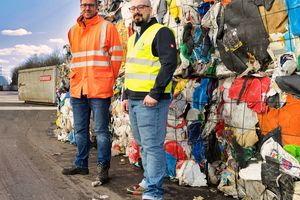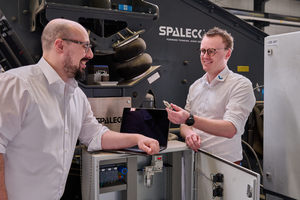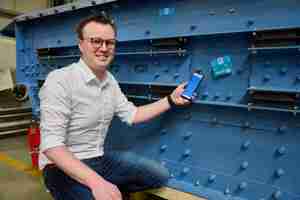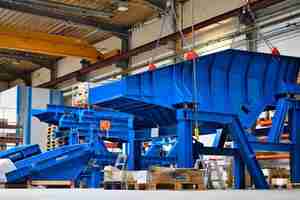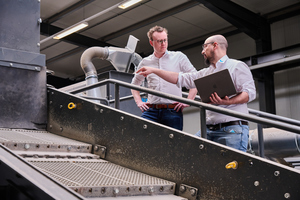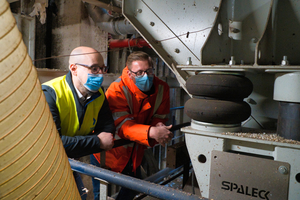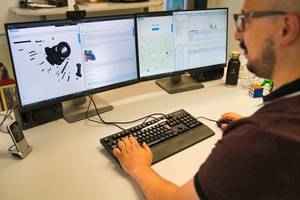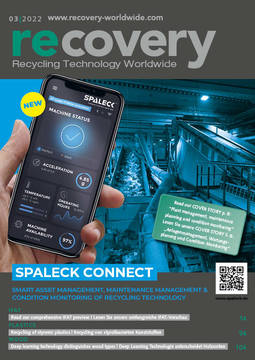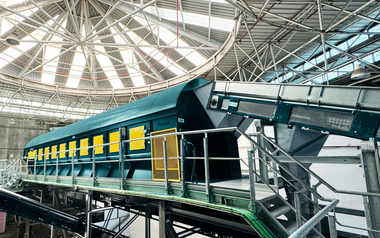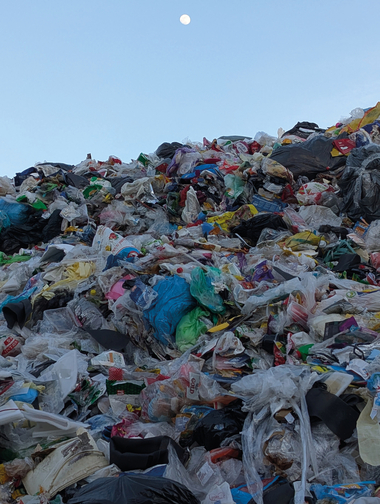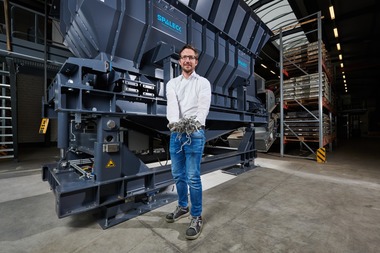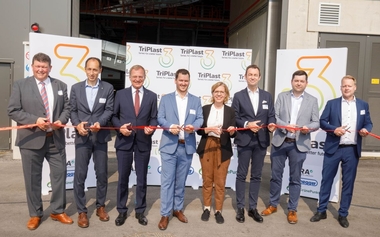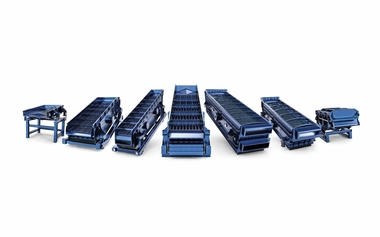Plant management, maintenance planning and condition monitoring
More than 460 material fractions are collected at REMONDIS Region Rheinland, processed or disposed of in cases where recycling is not possible. At the same time, REMONDIS is also active in the supply sector. Secondary raw materials have become increasingly important, not least since the EU‘s Green Deal. Once certified, these high quality, processed raw materials can be returned to industrial processes.
Before such recycled raw materials can be produced, however, they have to be intelligently processed using smart raw material sorting methods. This is also the case at REMONDIS‘ site in Erftstadt. Here, light packaging and household waste are sorted in two sorting plants.
The facility for sorting lightweight packaging (LVP) was newly built on a former logistics site in 2018. “The Packaging Act came into force on 1 January 2019 and we would not have been able to meet the requirements of this Packaging Act with the old sorting facilities,” explained David Schumacher from REMONDIS‘ operations management in Erftstadt. A good 60 employees work on the two sorting lines 24 hours a day, 5 days a week.
The material comes to Erftstadt from all over Germany, of course mainly from the Rhine-Ruhr region. “We take part in the tenders of the dual systems, and material from Thuringia, the Black Forest, Osnabrück, etc. has already been sorted here,” reports Schumacher. It is separated into the following fractions: Can and Al scrap, plastics such as polypropylene (PP), polyethylene (PE), polyethylene terephthalate (PET), polystyrene (PS), films – as well as tetrapacks, paper, hollow bodies and sorting residues. The aim is to return as much of the sorted materials as possible to the production cycle as raw materials in a climate-friendly way. REMONDIS Erftstadt fulfils all legal quotas. For sales packaging, these have been 63 % material recycling since 1 January 2022. Only residual materials, such as some composite materials, which can no longer be technically recycled, are then sent to substitute fuel production or directly to incineration in order to generate electricity and process or district heating as a high-calorific fuel which is not dependent on imports and is climate-friendly.
Approximately 25 t/h of LVP material is processed here – 120 000 t per year. These are the average figures from the last two years, and capacity utilization at the sorting plant has been good. However, Schumacher pointed out that the figures for this period might not be quite as representative due to the Corona pandemic.
State-of-the-art LVP processing
This modern recycling plant was designed and built by Stadler. The processing starts with two pre-shredders. These are to open the bags, but not to pre-shred the material. After that, the material is screened. Three SPALECK 3D vibrating screens and a screening drum are available for this purpose. The material then goes to sorting, with a total of 21 NIR sorting machines separating the different materials and above all the different types of plastic. Density sorting is carried out with the help of two ballistic separators before some of the fractions are packed into two balers.
Currently, Schumacher can see an increasing interest in the sorted products. “Within a few months, raw material prices have exploded; they are always a reflection of raw material availability,” Schumacher explains. “At the moment, we are also feeling increased demand from the packaging industry, especially the high-grade plastics such as PP, PE and PET are booming. And retailers are also interested in reusing their own packaging materials,” explains Schumacher. The company is also noticing a positive change in terms of how recyclable the packaging is. In the past, for example, many of the microwave trays for finished products were black. The disadvantage here is that these cannot be detected by the NIR sorting technology, or only with difficulty. Today, some of the trays are already white and so the PP can be recovered. “If you take a conscious look at the packaging you buy every day in the supermarket, you can definitely see positive developments,” says Schumacher.
But it is not only the manufacturers of packaging materials who are striving for further development; the recycling plants themselves are also working even more effectively and must be able to adapt flexibly to the constantly changing material flow. Thus, high-tech and smart technologies are also built into the ultra-modern recycling plants, to use buzzwords that are otherwise more commonly associated with other branches of industry.
SPALECK CONNECT: Smart plant management
In the field of conveying and separation technology, it is the SPALECK CONNECT technology. For more than a decade, SPALECK has already been working on the digitalization and networking of its plants. The goal is to optimize machine availability and maintenance. To ensure that this is achieved reliably and comprehensively with SPALECK CONNECT, especially in tough everyday use at the customer‘s site, SPALECK relied on collaboration with customers in the development of the IIoT-based CONNECT system (IIoT = Industrial Internet of Things). One of them is REMONDIS Erftstadt, where the system is already in use for data-based maintenance planning and optimization of plant availability.
SPALECK CONNECT uses sensors in and on the vibrating screens to monitor the plants via a connector, that sends predefined notifications to the plant operator in the event of important events, offers comprehensive knowledge management, and enables predictive maintenance planning and condition monitoring.
SPALECK CONNECT can be fully used with a simple browser on any end device – only an Internet connection is required on site. The system can also be fully integrated into the existing process control system of the respective customer. Be it via fieldbus, OPC-UA or a direct cloud-to-cloud connection. Pure offline operation with a local HMI is also possible.
Developed for recycling companies
“For us as a manufacturer of recycling technology, it was important during the development of SPALECK CONNECT to take concrete customer projects as well as user feedback as an essential basis,” explains Jörg Halladin, head of development at SPALECK. Due to the state-of-the-art LVP processing, the geographical proximity between REMONDIS in the Rhineland and SPALECK in the Münsterland as well as the previous cooperation between the two companies, SPALECK was able to win REMONDIS as an important development partner. In addition to the Erftstadt site, other recycling companies from Germany, other European countries and the USA were also involved in the development of SPALECK CONNECT.
High benefit in plant operation
“The SPALECK plants have now been running for three years and we are very satisfied with their availability. Of course, there was always potential for optimization. We then made changes to the plant together with SPALECK and learned a lot from them,” explains Schumacher. “Now with SPALECK CONNECT technology, the next step towards even higher plant availability and data-based optimization is possible. After all, availability is crucial for us and it can be increased even further if I perform preventive maintenance,” Schumacher points out.
Via the SPALECK CONNECT platform, relevant events are displayed at an early stage and concrete recommendations for action are given. Jörg Halladin: “Unlike human perception, our condition monitoring is based on the permanently available machine data. The main advantage is automatic monitoring and early detection of maintenance requirements.”
Schumacher continues: “I don‘t wait until the machine breaks down, but thanks to the automated monitoring with SPALECK CONNECT, I detect at an early stage if, for example, too much current is being drawn, the operating temperature of components changes in a relevant way, or the vibration behavior of a machine is unusual. Then the CONNECT system gives me direct information about what needs to be done and when – for example, whether I should replace a spare part or make a service appointment.” A SPALECK service employee is also available remotely if questions arise.
The future is digital
SPALECK‘s philosophy is to work with customers to develop the best solution for reprocessing their materials. Looking to the future of SPALECK CONNECT technology, Jörg Halladin is excited: “At IFAT 2022 in Munich, we will present the new SPALECK CONNECT platform. This will initially include plant management with comprehensive service notifications, user-friendly spare parts management, intelligent maintenance planning and condition monitoring.”
This enables the plant operator to easily visualize and evaluate essential data of his recycling technology and thus further optimize the uptime of his plant. Halladin continues: "Our goal with SPALECK CONNECT is not only to optimize the technical condition of the plant, as we are already doing, but also to optimize the treatment processes themselves in the coming years with the further development of CONNECT technology. Digitalization offers these opportunities!“
David Schumacher from REMONDIS‘ plant management in Erftstadt asked for his opinion on SPALECK CONNECT: “Our expectations of SPALECK CONNECT are already being fulfilled. With our good experiences so far, we are curious to see what else is possible in the future.”

